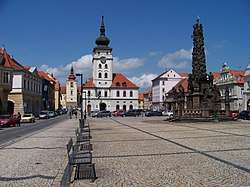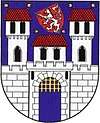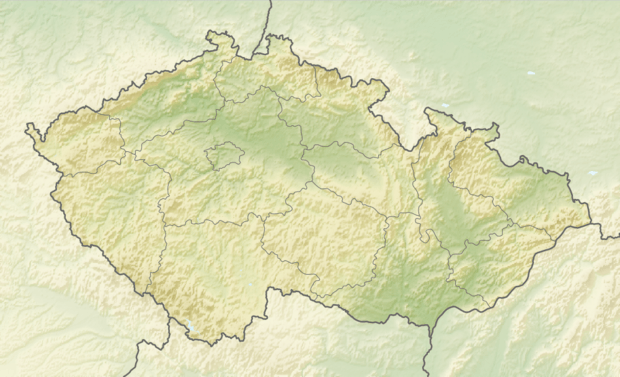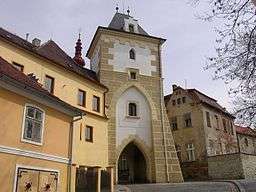Žatec
Žatec (Czech pronunciation: [ˈʒatɛts]; German: Saaz) is a historic town in Louny District, Ústí nad Labem Region, in the Czech Republic.
Žatec | |
|---|---|
Town | |
 Main square with town hall and trinity column | |
 Coat of arms | |
 Žatec Location in the Czech Republic | |
| Coordinates: 50°19′48″N 13°32′40″E | |
| Country | |
| Region | Ústí nad Labem |
| District | Louny |
| First mentioned | 1004 |
| Government | |
| • Mayor | Zdeňka Hamousová |
| Area | |
| • Total | 42.69 km2 (16.48 sq mi) |
| Elevation | 233 m (764 ft) |
| Population (2019-01-01[1]) | |
| • Total | 19,133 |
| • Density | 450/km2 (1,200/sq mi) |
| Time zone | UTC+1 (CET) |
| • Summer (DST) | UTC+2 (CEST) |
| Postal code | 438 01 |
| Website | www.mesto-zatec.cz |

It is famous for an over-700-year-long tradition of growing Saaz noble hops used by several breweries. Žatec produces its own beer and hosts 'Dočesná', its hops-related harvest festival every year on the town square.
History
The earliest historical reference to the Bohemian fortress of Sacz is in the Latin chronicle of Thietmar of Merseburg of 1004, when King Henry II of Germany reconquered it from the Polish duke Bolesław I Chrobry. During the 11th century it belonged to the Vršovci - a powerful Czech aristocratic family. It received the privileges of a royal town under King Ottokar II of Bohemia in 1265. A coat-of-arms was given to the citizens by King Vladislav II for their courage during the storming of Milan.
From the outbreak of the Hussite Wars in 1419 to the Thirty Years' War, the town was Hussite or Protestant, but after the Battle of White Mountain (1620) the greater part of the Czech inhabitants left the town, which remained German and Roman Catholic until 1945, when the German speaking inhabitants were forced to leave their home and expelled to Germany. On June 3, 1945 about 5,000 German inhabitants were gathered on the Market place and marched to Postoloprty, where at least 763 were murdered in the Postoloprty massacre, estimates range up to 2,000 victims killed by Czechoslovak military in Žatec and on the March.[2]
During and after the Second World War a Messerschmitt production facility and air base for testing aircraft, including new jet fighters, was located close to the town. In 1948 the production facility continued to produce the Avia S-199, a version of the Messerschmitt Bf 109 aircraft which were sold to Israel, with the initial training for the Israeli pilots provided at the air base. Many other military supplies were flown to Israel from the air base, which helped the new state to secure its independence.
The Czech Culture Ministry sent the nomination of Zatec as the town of hops for listing among the world heritage to the UNESCO committee on 29/05/2007. Unfortunately within this round Zatec did not make UNESCO World Heritage Sites list, but it has been encouraged by the respective committee assessing nominations to try again.[3]
In 2018, Žatec was used as one of the locations for the Oscar-winning film, Jojo Rabbit.
People
- Gabriel Anton
- Peter Glaser
- Eugen Gura
- Petr Kotvald
- Johannes von Tepl
- Karel Reiner
- Adolf Strauss
- Jan Svěrák
- Zdeněk Svěrák
- Maria Treben
- Miroslav Varga
- Marie Rumanová
Twin towns — sister cities
Žatec is twinned with:[4]
See also
References
- "Population of municipalities of the Czech republic". Czech Statistical Office. Retrieved 2019-04-30.
- Mord im Fasanengarten, Der Spiegel, 31 August 2009 (German)
- "Žatec fails to make UNESCO World Heritage Sites list | Radio Prague". Radio Praha. Retrieved 2018-12-13.
- "Partnerská města" (in Czech). Město Žatec. Retrieved 2019-08-23.
External links
| Wikimedia Commons has media related to Žatec. |
| Wikisource has several original texts related to: Žatec |